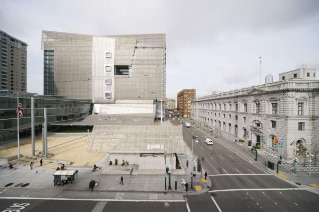As the global annihilation of the elderly silences cities that have become coffins of glass and cement, (closed) bookshops in the epicentre of the disaster are seeing the return of The Culture of Narcissism, a forgotten book that shines light on the fury of dark and mysterious events.
“Our society notoriously finds little use for the elderly. It defines them as useless, forces them to retire before they have exhausted their capacity to work, and reinforces their sense of superfluidity at every opportunity. By devaluating experience and setting great store by physical strength, dexterity, adaptability and the ability to come up with new ideas, society defines productivity in ways that automatically exclude ‘senior citizens’”.
A non-conformist who left us too soon, Christopher Lasch foresaw the dramatic transformation of a world where the loss of any idea of the past destroyed all hopes for the future. The focusing on the financial aspects of reality, the cancellation of memory and the death of art were not yet daily experiences, but they were already forebearers of a delirious society. Buoyed by the eternal youth guaranteed by zero growth, this new society in search of knowledge, rather than opening the door, locked itself in the bathroom to examine itself in the mirror. Sounds familiar?
Unshakeable convictions swept away in just a couple of hours by the pandemic, uncovering the fundamental elements of life such as fragility, mystery and the heart.
Lasch depicted a new and multiform human that substituted the homo economicus in an unexpected manner. This being was no simple egoist, but instead a more sophisticated and anxious creature, and as such condemned to an eternal unsatisfactory present. Having exhausted its work ethic and trust in social progress, “psychological man” found itself adrift in the midst of self-serving individualism, with no safety net to save it from the inevitable fall. This was the narcissist.
But is this not the type of human that is now surrendering in our cities in the face of the Covid-19 epidemic? A subject that believed themselves to be free of all obstacles, nomadic by vocation and profession, devoid of limits and boundaries, satisfied with their global centrality and driven by the idea of continuous growth and scientific progress that guarantees all forms of care, eradicates all disease and theoretically allows immortality. Enclosed within the security of home automation, the narcissist controls everything, provides for everything and organises everything around their own ego; not sex, but love itself. Unshakeable convictions swept away in just a couple of hours by the pandemic, uncovering the fundamental elements of life such as fragility, mystery and the heart.
“Liberalism, the political theory of the ascendant bourgeoisie, long ago lost the capacity to explain events in the world of the welfare state and the multinational corporation; nothing has taken its place. The sciences it has fostered, once confident of their ability to dispel the darkness of the ages, no longer provide satisfactory explanations of the phenomena they profess to elucidate. Neoclassical economic theory cannot explain the coexistence of unemployment and inflation. A denial of the past, superficially progressive and optimistic, proves on closer analysis to embody the despair of a society that cannot face the future”.
We have replaced character building with the right to comfort; respect for rules with self-indulgence; care for the soul with that of the psyche; and the authoritativeness of the wise with the authoritarianism of opinion leaders. But above all, we have abandoned the desire for beauty.
A re-reading of Lasch is no antidote to a virus of which science knows nothing, to a single market that has faltered, to a form of delocalisation that has been quarantined, or an invincible society at its wits’ end after three weeks without a happy hour. However, it helps us to understand the calls for Medieval solutions – from new private quarantine stations to herd immunity – when a sense of community is suffocated by the true essence of individual nations. After having defeated the global GDP and claimed sacrificial victims, there will be a return to the comforting rituals of a mega-machine that cannot and will not change, above all with regards to the relationship between information and politics. “it is evident that the rise of mass media makes the categories of truth and falsehood irrelevant to an evaluation of their influence. Truth has given way to credibility, facts to statements that sound authoritative without conveying any authoritative information, when politicians and administrators have no other aim than to sell their leadership to the public”.
This is not the vision of Domus, which in the 1920s sought to provide meaning to society through an interpretation of architecture, design and art. Domus will thus continue provide a critical point of view, examining the world from Milan not simply in line with its traditional goals, but because it believes, like Lasch, that “the democratization of education has neither improved popular understanding of modem society, raised the quality of popular culture, nor reduced the gap between wealth and poverty, which remains as wide as ever. On the other hand, it has contributed to the decline of critical thought and the erosion of intellectual standards”. Without going into sophisticated analysis, one only needs to look at the dizzying spectacle of television opinion leaders, design experts, trendy architects and arty socialites.
Our Twenties, which have only just begun, are very similar to those of a century ago. We are still a Grand Hotel teetering on the edge of the abyss, with the orchestra continuing to play and the skirts of the ladies glittering against the tailcoats of the gentlemen. Yet everything has changed. We have replaced character building with the right to comfort; respect for rules with self-indulgence; care for the soul with that of the psyche; and the authoritativeness of the wise with the authoritarianism of opinion leaders. But above all, we have abandoned the desire for beauty in favour of a hunger for the distasteful, transforming a duty to beauty with a right to be beautiful. It is hard to believe things could get any worse.
Preview image: James Ensor, Self-Portrait with Masks, 1899.







